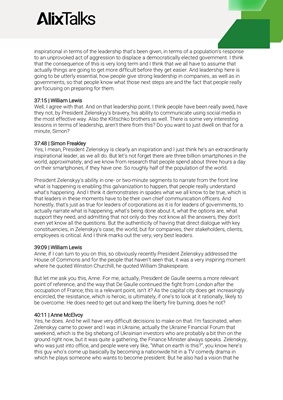
attempts to try and figure out what we can do about the 2019 ban on the importation of
Venezuelan oil. There's things that can be done to lessen the impact. But, I agree it's going to
be oil and gas, ultimately, that is going to probably be what turns the tide.
As far as where you're going to turn the tide, obviously there was some conjecture as to
regime change and things like that, which was quickly stepped back. I don't think that is what
anybody, any country, is actually aiming for. What they're trying to do is get to a peace, a
lasting peace in that region. And I think that the way they're going to do that is a combination
of these sanctions, and a strengthening and making them hurt more and more. It's probably
going to be weapons sales, and weapons deliveries, and donations and things like that that's
also going to play. I don't think anybody's kidding themselves, it's all going to be sanctions
driven, that the whole thing is going to be influenced only by sanctions. It's a combination of
things. But I think it's a lasting peace, coming up with a negotiated settlement and forcing real
negotiations to take place is, I think, the ultimate goal here.
36:32 | William Lewis
Guy, what's your perspective, please, on that?
36:34 | Guy Harrison
I think that sanctions can actually play a very real role in preventing further escalation. If, and
by the way to your previous question, I think that oil and gas will be sanctioned. I think the
question is less will they or won't be, but once they are, how long can we actually sustain
those sanctions? And how long can we sustain the home impact of those sanctions? But I
think if we do that, then really you're removing the funding for the Russian war effort. And if
you can remove that funding, then that should bring about a peace sooner rather than, I would
hope that it would bring about a peace sooner rather than later. There's a very helpful tracker
online which shows how much the EU has paid Russia for fossil fuels since the 24th February.
That's currently standing at 20 billion.
36:35 | William Lewis
Wow.
37:36 | Wendy Wysong
There's a lot of really helpful trackers on the Internet, in sort of Guy getting to your point about
what companies are doing, what companies are actually doing. Yale does a very interesting
tracking where they track companies that have actually withdrawn completely, some that
have suspended, some that are scaling back, some that have dug in, and making, I think
there's five gradations that they're listing. I think it's been fascinating figuring out the
information and how these things are being tracked to figure out what impact is actually
taking place, instead of looking just at the headlines "Everybody's leaving Russia!", you can
actually sort of figure out more of the nuances as to the impact of these sanctions.
38:28 | William Lewis
And Tom, I want to come to you in a second and talk about the U.S. treasury because that,
obviously, in all of these conversations looms large.
But there is another question that's come in which is slightly off message but when I get it in
for us from Peter Mains, which is quite interesting. Given the reaction to the likes of
McDonald's, is social media more effective than legal sanctions? Now, I'm looking at you and
Wendy.